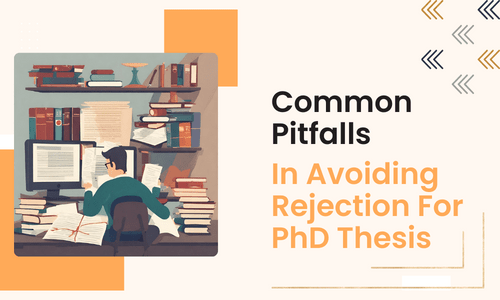Starting the process of writing a PhD thesis is a huge undertaking, but one that comes with its own set of challenges and uncertainties. One of the most formidable obstacles that aspiring researchers face is the fear of PhD thesis rejection. As we delve into the world of academia, where knowledge is rigorously scrutinized, it is crucial to be aware of the common pitfalls that can lead to the rejection of your painstakingly developed thesis. In this exploration of common pitfalls in avoiding rejection for PhD thesis, we will unravel the PhD thesis rejection reasons and equip you with invaluable insights to navigate this treacherous terrain successfully. Whether you are just beginning your doctoral journey or have experienced the frustration of a PhD thesis rejected, this guide aims to provide you with essential knowledge and strategies to ensure that your research is met with the approval it deserves.
1.Poor Research Design:
Failing a PhD dissertation happens for a few common reasons, and one biggie is bad research design. Another big one, according to the folks on the examination committees, is that people often don’t critically analyze their stuff. Your dissertation isn’t just about regurgitating what others have already said or done – it needs to bring something fresh to the table. Oh, and here’s a tip: your thesis should be like a well-orchestrated symphony, not a random mixtape of chapters thrown together without rhyme or reason. Spend some quality time upfront thinking about how to structure the whole thing, from the big picture to the nitty-gritty chapter details. And let’s not forget about the presentation. Most of the dissertations that flop are full of silly mistakes – typos, grammar bloopers, messed-up references, and just plain messy formatting. Trust me, committee members don’t appreciate a hot mess of a dissertation.
2. Originality and Contribution:
So, when you’re avoiding rejection for PhD thesis, here’s the deal: it’s not just about summarizing stuff; you’ve got to bring something fresh to the table. It’s like adding your special spice to the academic stew. There are different ways to do this – you can mix and match existing ideas, come up with a brand-new technique, or put a unique spin on old knowledge. But here’s the kicker: your thesis should flow smoothly like a well-written story, not be a mishmash of random chapters. Think of it as crafting a good playlist, not just throwing together a bunch of random songs. Keep it all coherent and connected. Oh, and here’s a pro tip from an article in University Affairs Career Advice: Don’t try to reinvent the wheel or act like you’re the ultimate expert in your field. Sometimes, the gold lies in those tiny gaps within well-studied areas, where you can bring in fresh perspectives or give old ideas a new twist.
3. Citation and Plagiarism:
When you’re trying to understand your PhD thesis rejection reasons, you have to be super careful about citation and plagiarism. Now, here’s an interesting tidbit: the University of Mysore actually says it’s okay to have up to 30% of your thesis match with other sources. But remember, it’s not a free pass to copy and paste; it’s more like a guideline because the plagiarism levels are different according to institutions and journal demands. To stay on the safe side and dodge any plagiarism bullets, it’s smart to run your thesis through plagiarism checkers. These tools help make sure your work is all your own and doesn’t accidentally match up with someone else’s stuff. And don’t forget, you should always cite every source you use, even if it’s your own work.
4. Language and Writing Quality:
A well-written PhD thesis is essential for success. Here are some more specific and practical tips to help researchers improve the quality of their thesis:
i. Clarity and Structure: Your thesis should have a clear and logical structure. Each chapter or section should flow naturally from the previous one. Organise your writing with headings and subheadings to help the reader.
ii. Audience Awareness: Keep in mind that your thesis will be read not only by experts in your field but also by a broader academic audience. Avoid excessive jargon, and when you do use technical terms, provide clear explanations.
iii. Active Voice: Active voice is indeed more reader-friendly. Your writing becomes more interesting and direct as a result. Instead of saying “It was observed that,” say “I observed that.”
iv. Conciseness: Be concise and avoid unnecessary repetition. Remove any sentences or paragraphs that don’t contribute to your main argument.
Remember that a PhD thesis is a significant scholarly achievement, and the quality of your writing is a reflection of your dedication and expertise. Taking the time to write a clear, well-structured, and error-free thesis will greatly enhance its impact and impress your committee members.
5. Feedback and Peer Review:
When you’re dealing with a PhD thesis rejected, remember that feedback and peer review are your secret weapons for making that document shine. Your thesis journey is like a team sport – your chair and committee members are your MVPs. They’ll give you the guidance you need to level up your work and become a true scholar. In order to enhance the effectiveness of peer review in academia, it is imperative to establish clearer guidelines for assessing feedback quality and implementing additional training for faculty members who participate in the review process. This approach will ensure that everyone involved is aligned in their understanding of what constitutes constructive feedback and how to provide it, ultimately contributing to the improvement and refinement of research work like your thesis.
Final thoughts
In conclusion, navigating the intricate journey of crafting a successful PhD thesis and avoiding rejection for PhD thesis can be a challenging endeavor. This process demands meticulous attention to detail, unwavering dedication, and a deep understanding of the common PhD thesis rejection reasons. The pitfalls discussed in this exploration shed light on the crucial aspects that aspiring doctoral candidates must be vigilant about. From conducting thorough research and robust proofreading to ensuring proper citation and adherence to guidelines, each step plays a pivotal role in mitigating the risk of having one’s PhD thesis rejected. By proactively addressing these common pitfalls, students can significantly enhance their chances of success and gain valuable insights that will serve them well throughout their academic careers.
At PhDThesis, we understand the anxieties and pressures that come with pursuing a doctorate, and we’re committed to helping you navigate the complex landscape of PhD thesis writing. Our dedicated team of experts and comprehensive services are designed to assist you at every stage of your thesis journey. From refining research proposals and conducting rigorous editing to providing guidance on structuring and formatting your thesis, we are here to ensure that your hard work and dedication culminate in a successful PhD thesis submission. With our support, you can confidently tackle the challenges that often lead to PhD thesis rejection and take a significant step towards achieving your academic goals.
FAQs
1 .Causes of manuscript rejection and how to handle a rejected manuscript?
Ans. Causes of manuscript rejection are multifaceted and can include issues like poor study design, inadequate literature review, or subpar writing. To handle a rejected manuscript, carefully assess reviewer comments, revise diligently, and seek feedback from colleagues or mentors. Learning from the reasons behind the rejection can help you improve and increase your chances of acceptance, just as one would in avoiding rejection for a PhD thesis.
2. What happens if your PhD dissertation is rejected?
Ans. If your PhD dissertation is rejected, it can be disheartening but isn’t the end of the road. Review the rejection feedback, consult with your advisor, and revise your work meticulously. Resubmitting an improved version can often lead to acceptance. Remember, facing initial setbacks is part of the PhD journey, and persistence is key to overcoming PhD thesis rejection reasons.
3. How to develop a quality research article and avoid a journal desk rejection?
Ans. Developing a quality research article that avoids journal desk rejection involves meticulous planning, thorough literature review, robust methodology, and adherence to journal guidelines. Seek feedback from peers or mentors to refine your work before submission. By taking these steps, you can significantly reduce the risk of encountering rejection and better understand how to avoid rejection for a PhD thesis in the future.
4. Can a PhD proposal be rejected?
Ans. Yes, a PhD proposal can be rejected if it fails to meet the standards set by the reviewing committee or if it lacks a clear research question, sound methodology, or relevance. To prevent this, ensure your proposal is well-researched, structured, and aligned with your field’s expectations, ultimately mitigating the likelihood of a PhD proposal being rejected and helping you navigate the path toward your PhD thesis successfully.

